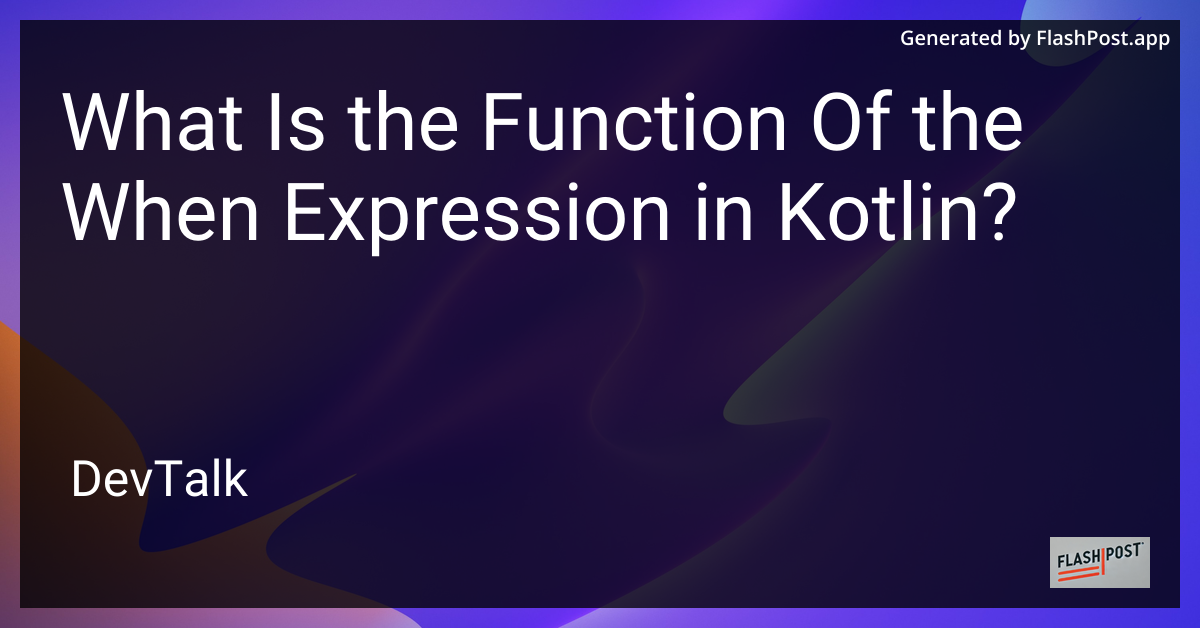What Is the Function Of the When Expression in Kotlin?

Understanding the Function of the when Expression in Kotlin
Kotlin, a modern programming language that has gained considerable popularity, offers a multitude of powerful features.
One such feature is the when expression, which provides an expressive and versatile way of handling conditional logic. In this article, we'll explore the function and advantages of using the when expression in Kotlin.
What is the when Expression?
The when expression in Kotlin is a more flexible and concise replacement for the traditional switch statement found in many other programming languages. It allows developers to execute different branches of code based on the value of a particular expression or variable.
Here's a simple example of a when expression in Kotlin:
val dayOfWeek = 3
val dayName = when (dayOfWeek) {
1 -> "Monday"
2 -> "Tuesday"
3 -> "Wednesday"
4 -> "Thursday"
5 -> "Friday"
6 -> "Saturday"
7 -> "Sunday"
else -> "Invalid day"
}
println(dayName) // Output: Wednesday
In this example, the expression dayOfWeek is compared to various cases, and the corresponding block of code is executed based on the matched case.
Advantages of Using when
Readability and Conciseness
The when expression enhances code readability by reducing boilerplate and making complex conditions easier to understand. It aggregates similar logic into a single, clean structure that is intuitive and efficient.
Versatility
Unlike the traditional switch statement, the when expression in Kotlin supports multiple data types, including Int, String, Boolean, and even custom objects. This flexibility allows for a wide range of use cases.
val obj: Any = "Hello"
val result = when (obj) {
is String -> "It's a string"
is Int -> "It's an integer"
else -> "Unknown type"
}
println(result) // Output: It's a string
Pattern Matching
Kotlin's when enables pattern matching, allowing developers to evaluate a condition or value and execute a specific path if a match is found. This capability simplifies complex conditional logic and enhances clarity.
Feature-Rich Substitutions
The inclusion of ranges, collections, and arbitrary conditions in when expressions allows for more nuanced comparisons, providing developers with powerful tools to write sophisticated conditional logic with minimal effort.
val score = 85
val grade = when {
score >= 90 -> "A"
score in 80..89 -> "B"
else -> "C"
}
println(grade) // Output: B
Conclusion
The when expression in Kotlin offers a powerful and versatile approach to manage conditional logic, elevating code readability and maintainability. By embracing features like pattern matching and flexible case options, Kotlin developers can write elegant and efficient code.
If you're interested in diving deeper into Kotlin's features, check out these insightful resources:
- Learn how to make API request calls in Kotlin
- Understanding kotlin abstract methods
- Implementing form submission restrictions in Kotlin
By exploring these topics, you’ll be well-equipped to leverage Kotlin's robust capabilities in your applications.
This article is tailored to provide valuable insights into the `when` expression in Kotlin, with additional resource links for further exploration of Kotlin’s diverse capabilities.